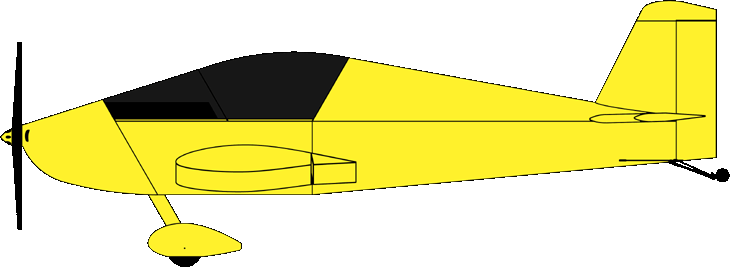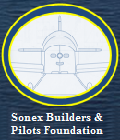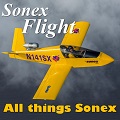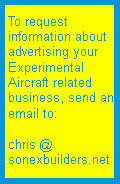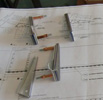

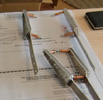
random user submitted photo
Engine Hours
12 posts
• Page 1 of 2 • 1, 2
Engine Hours
Hi Guys
I am looking at my next project being a Waiex B and given the new supported engine options I wanted to ask a few questions about the Aerovee.
I have been flying for over 4 years now, built a Skyranger Nynja powered by a Rotax 912ULS, sold that and am now flying a Europa XS Tri Gear. I also have a few months work left to complete a Europa Mono Wheel both of which are Rotax 912 ULS powered. I know that with care and regular servicing the 912 engines have a TBO of 2000 hrs and in our case here in the UK can go longer "on condition" One of my local flying clubs has some with over 4000 hrs with no major surgery ever needed.
With this in mind I have a couple questions on the Aerovee range (actually will probably be more):
1 - within the Aerovee operators community what's the expected TBO life of the engines - has anyone gone past the 1000hr mark with basic servicing
2 - are the stated HP ratings calculated figures or actually dyno measured data
It is rumored that the 80hp actually doesn't get near that figure and has the new 100hp Turbo version actually been dyno tested to validate hp figures. I have seen the video footage of the engine on the Sonex engine test cell but don't know if that is anything more than an engine run up bench.
I really fancy the Aerovee Turbo but at this stage I know what I got in the 912 and am conscious about the cost differences. However from experience this is a "fit and forget" package.
Thanks in advance for any feedback
Cheers
Bryan
I am looking at my next project being a Waiex B and given the new supported engine options I wanted to ask a few questions about the Aerovee.
I have been flying for over 4 years now, built a Skyranger Nynja powered by a Rotax 912ULS, sold that and am now flying a Europa XS Tri Gear. I also have a few months work left to complete a Europa Mono Wheel both of which are Rotax 912 ULS powered. I know that with care and regular servicing the 912 engines have a TBO of 2000 hrs and in our case here in the UK can go longer "on condition" One of my local flying clubs has some with over 4000 hrs with no major surgery ever needed.
With this in mind I have a couple questions on the Aerovee range (actually will probably be more):
1 - within the Aerovee operators community what's the expected TBO life of the engines - has anyone gone past the 1000hr mark with basic servicing
2 - are the stated HP ratings calculated figures or actually dyno measured data
It is rumored that the 80hp actually doesn't get near that figure and has the new 100hp Turbo version actually been dyno tested to validate hp figures. I have seen the video footage of the engine on the Sonex engine test cell but don't know if that is anything more than an engine run up bench.
I really fancy the Aerovee Turbo but at this stage I know what I got in the 912 and am conscious about the cost differences. However from experience this is a "fit and forget" package.
Thanks in advance for any feedback
Cheers
Bryan
- bryannortje
- Posts: 6
- Joined: Sat Dec 12, 2015 10:59 am
- Location: United Kingdom
Re: Engine Hours
Hi Brian,
I am not completed and flying yet so by no means am I an expert, but have spent a lot of time on these forums looking for answers to the questions you have asked. Here is what I can glean:
1. TBO. To be honest, I think most Aerovee owners are doing some sort of major overhaul by the 500 hour mark. However, this is not the same big deal it is for the Rotax, costing in the 5-digit range. Most guys say they can do it in a few evenings for under a thousand.
2. Horsepower. I wouldn't be so focused on the dyno horsepower numbers, instead on the real world performance of the engine/airframe combo. Dyno HP measurements are tricky business, affected by atmospheric conditions and a multitude of other factors. Additionally, it doesn't say much about low end torque and other elements of performance. The bottom line is that you can get pretty good performance out of the Aerovee in the Sonex airframe, provided that you keep it light. If you are hot, humid, heavy, and high you will have problems. It seems that the turbo has really improved the performance.
Hope this helps. Take a look at some older threads on these topics, I think you'll find lots of good information from the experienced folks here.
I am not completed and flying yet so by no means am I an expert, but have spent a lot of time on these forums looking for answers to the questions you have asked. Here is what I can glean:
1. TBO. To be honest, I think most Aerovee owners are doing some sort of major overhaul by the 500 hour mark. However, this is not the same big deal it is for the Rotax, costing in the 5-digit range. Most guys say they can do it in a few evenings for under a thousand.
2. Horsepower. I wouldn't be so focused on the dyno horsepower numbers, instead on the real world performance of the engine/airframe combo. Dyno HP measurements are tricky business, affected by atmospheric conditions and a multitude of other factors. Additionally, it doesn't say much about low end torque and other elements of performance. The bottom line is that you can get pretty good performance out of the Aerovee in the Sonex airframe, provided that you keep it light. If you are hot, humid, heavy, and high you will have problems. It seems that the turbo has really improved the performance.
Hope this helps. Take a look at some older threads on these topics, I think you'll find lots of good information from the experienced folks here.
Mike L
Sonex #1345
Tail complete
Working on wings
Sonex #1345
Tail complete
Working on wings
- samiam
- Posts: 209
- Joined: Thu Oct 03, 2013 7:24 am
- Location: S37
Re: Engine Hours
Hi Mike
I am looking at most of the various forums a couple times a day so am pretty up to speed on most of the techy stuff
I wanted to get an idea of what the expectation is of engine performance and maintenance costs from the guys running the Aerovee engines. Obviously it will be some time before there is any "in the field" data / feedback from Turbo Vee owners. I accept and realize that cost to overhaul the 912 series engines is massive compared to the aerovee, but out the box I do not expect to need to do so for at least 2000 hrs - as far as "regular" servicing the costs should be the same.
As far as HP is concerned I follow and agree with what you have said as there are many factors to influence the numbers. I have seen far to many "spec sheet" numbers and in practice they don't stack up - I agree the turbo option has probably put quite a few smiles on the dials of the owners that have done the conversions.
I am looking at most of the various forums a couple times a day so am pretty up to speed on most of the techy stuff
I wanted to get an idea of what the expectation is of engine performance and maintenance costs from the guys running the Aerovee engines. Obviously it will be some time before there is any "in the field" data / feedback from Turbo Vee owners. I accept and realize that cost to overhaul the 912 series engines is massive compared to the aerovee, but out the box I do not expect to need to do so for at least 2000 hrs - as far as "regular" servicing the costs should be the same.
As far as HP is concerned I follow and agree with what you have said as there are many factors to influence the numbers. I have seen far to many "spec sheet" numbers and in practice they don't stack up - I agree the turbo option has probably put quite a few smiles on the dials of the owners that have done the conversions.
- bryannortje
- Posts: 6
- Joined: Sat Dec 12, 2015 10:59 am
- Location: United Kingdom
Re: Engine Hours
AeroConversions has a dyno chart on their website.
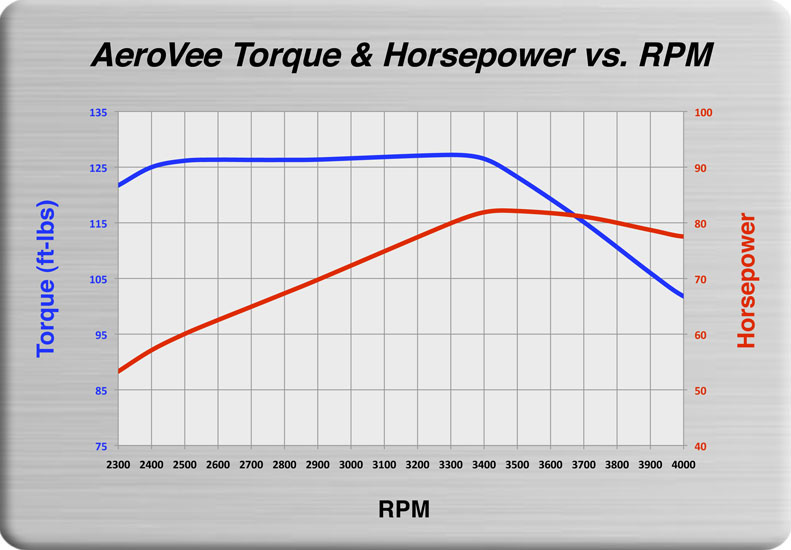
In my experience, the chart seems correct when considering my fuel burn once corrections are made for atmospheric density. My propeller limits me to < 3000 rpm in climb-out so only ~70 hp is available. Once I level out, the engine spins faster and fuel burn increases, but not quite to the 3300 rpm where 80 hp is available, but then I'm no longer at sea level. I think the propeller recommended by Sonex allows a little more RPM than I see.
It's a different experience from the other flying I've done where the engine's redline (where maximum rated power is available) is low enough that you have to pull the power back when leveling out from a climb. In this case the rated engine power might be closer to what you see in a climb. If climb performance is important to you, it is important to realize where on the power curve you'll be with your chosen propeller.
I have ~160 hours on my Aerovee and have lapped two exhaust valves. I don't know that I really needed to, but once I could tell there was a leak, it was easy enough to do the work that I did it. I torque the head nuts and adjust the valves according to the schedule. Honestly, it seems a lot of Aerovee builders end up tearing down their engine before 1000 hours, but I'm not sure what the statistics or reasons are. The Nikasil cylinders from a few years ago caused a lot of problems you won't have to worry about since they're no longer offered. The internals seem pretty robust, but it seems valve work is common.
I am pretty certain that the 912 will be much more of a "fit and forget" package and that has definite value. It seems to be a fantastic engine as you already know. Only problem is the price :-) I'm glad that it is an option now, but am happy with the money I saved choosing the Aerovee.

In my experience, the chart seems correct when considering my fuel burn once corrections are made for atmospheric density. My propeller limits me to < 3000 rpm in climb-out so only ~70 hp is available. Once I level out, the engine spins faster and fuel burn increases, but not quite to the 3300 rpm where 80 hp is available, but then I'm no longer at sea level. I think the propeller recommended by Sonex allows a little more RPM than I see.
It's a different experience from the other flying I've done where the engine's redline (where maximum rated power is available) is low enough that you have to pull the power back when leveling out from a climb. In this case the rated engine power might be closer to what you see in a climb. If climb performance is important to you, it is important to realize where on the power curve you'll be with your chosen propeller.
I have ~160 hours on my Aerovee and have lapped two exhaust valves. I don't know that I really needed to, but once I could tell there was a leak, it was easy enough to do the work that I did it. I torque the head nuts and adjust the valves according to the schedule. Honestly, it seems a lot of Aerovee builders end up tearing down their engine before 1000 hours, but I'm not sure what the statistics or reasons are. The Nikasil cylinders from a few years ago caused a lot of problems you won't have to worry about since they're no longer offered. The internals seem pretty robust, but it seems valve work is common.
I am pretty certain that the 912 will be much more of a "fit and forget" package and that has definite value. It seems to be a fantastic engine as you already know. Only problem is the price :-) I'm glad that it is an option now, but am happy with the money I saved choosing the Aerovee.
Last edited by gammaxy on Fri Apr 15, 2016 2:51 pm, edited 1 time in total.
- gammaxy
- Posts: 601
- Joined: Wed Sep 04, 2013 9:31 am
Re: Engine Hours
Bryan,
First I would like to extend a welcome as a fellow Y Bryan. We are about as exclusive as Waiex builders. Some of us like myself are dounle exclusive.
When I went to the workshop a couple years ago, I am pretty sure they had a water brake dyno. If I am wrong somebody could jump in and correct me. I like that sort of stuff. Used a Dyn-O-Mite water brake dyno on a small UAV engine 16-17 years ago and it was fun.
First I would like to extend a welcome as a fellow Y Bryan. We are about as exclusive as Waiex builders. Some of us like myself are dounle exclusive.
When I went to the workshop a couple years ago, I am pretty sure they had a water brake dyno. If I am wrong somebody could jump in and correct me. I like that sort of stuff. Used a Dyn-O-Mite water brake dyno on a small UAV engine 16-17 years ago and it was fun.
Bryan Cotton
Poplar Grove, IL C77
Waiex 191 N191YX
Taildragger, Aerovee, acro ailerons
dual sticks with sport trainer controls
Prebuilt spars and machined angle kit
Year 2 flying and approaching 200 hours December 23
Poplar Grove, IL C77
Waiex 191 N191YX
Taildragger, Aerovee, acro ailerons
dual sticks with sport trainer controls
Prebuilt spars and machined angle kit
Year 2 flying and approaching 200 hours December 23
-

Bryan Cotton - Posts: 5493
- Joined: Mon Jul 01, 2013 9:54 pm
- Location: C77
Re: Engine Hours
Hi Bryan C
have ben following your posts on your build and all the info you frequently share. Very nice and thanks for that.
Seems like we could share some stories on UAV's. I have been heavily involved in the past and would love to get back into it some day. I see you not to far away from the hornets nest !!
have ben following your posts on your build and all the info you frequently share. Very nice and thanks for that.
Seems like we could share some stories on UAV's. I have been heavily involved in the past and would love to get back into it some day. I see you not to far away from the hornets nest !!
- bryannortje
- Posts: 6
- Joined: Sat Dec 12, 2015 10:59 am
- Location: United Kingdom
Re: Engine Hours
Wow, a very exclusive club. Y Bryans into Waiexes who used to be into UAVs. We have another Waiex UAV guy in the forums here but he is a Kevin with no Y. We could call him Kevyn I guess. My avatar was the UAV I did a lot with - the Sikorsky Cypher.
Thanks for the kind words on my posts!
Thanks for the kind words on my posts!
Bryan Cotton
Poplar Grove, IL C77
Waiex 191 N191YX
Taildragger, Aerovee, acro ailerons
dual sticks with sport trainer controls
Prebuilt spars and machined angle kit
Year 2 flying and approaching 200 hours December 23
Poplar Grove, IL C77
Waiex 191 N191YX
Taildragger, Aerovee, acro ailerons
dual sticks with sport trainer controls
Prebuilt spars and machined angle kit
Year 2 flying and approaching 200 hours December 23
-

Bryan Cotton - Posts: 5493
- Joined: Mon Jul 01, 2013 9:54 pm
- Location: C77
Re: Engine Hours
A difficult subject for me since I have a love/hate relationship with my AeroVee. It has, and continues, to meet my price point. But 80hp even for a fairly light Sonex (mine is a reasonable 650 lbs) can get dicey when it's hot out and you're flying at gross. Some people point out that they fly solo so gross is not a concern, but I flew solo to Airventure last year and with fuel and gear I was at gross. Taking off in the mountains of Pennsylvania on a hot day was a bit more pucker factor than I would have liked. I had the Sensenich ground adjustable prop and even on the finest (climb) setting it was not performing well. I now have the Sensenich fixed pitch prop and I do get better performance, but flights when I'm heavy are still not what I would hope.
So what's good about an AeroVee? Price is hard to beat. Simplicity, ease of maintenance and low cost of parts are all great features. I'll give examples.
I originally bought the engine with the Nickasil cylinders to save weight. Over the first year and 90 hours the engine was making metal. Upon inspection I found the cylinders were deforming at the heads and needed to be replaced. Now I have the cast iron cylinders and all is well. But I had to replace they cylinders/pistons and all the bearings, after cleaning the inside of the engine. Total cost of parts was several hundred dollars (Sonex was kind enough to offer a good discount on the new parts). Since this was the second time I built up the engine it took me a couple of weeks to do the work.
This past February I had a severe prop strike. The prop broke and the woodruff key holding the prop hub on the crank sheared. I had to replace the crank, main bearings and prop. Not including the prop the parts cost me about $900. That sounds like a lot, but considering the parts replaced it's way less than most any other engine. I might have been able to get away without replacing the crank, but it would have taken time and money to send it out to have it tested, so I decided to buy a new crank. This time I took the engine apart in 2 evenings, and put it back together in 2 more evenings.
I have a small black bag with all my tools that I travel with. It weighs about 10 lbs. With the tools and parts in that bag I can damn near re-build the engine. That's one of the beauties of the VW engine: very simple and very easy to fix and maintain.
I consider the VW engine a tinkerer's engine. If nothing else I spend time adjusting the valve rocker gap every 20-50 hours. But that takes me about 15 minutes to do, so not a big deal. The AeroInjector carb has worked flawlessly for me once I got the right needle in place (that took some trial and error at the beginning). Not everyone has had that experience.
There is no TBO on a VW engine. I get oil analysis ever oil change (which is how I found the metal when I had the Nickasil cylinders) and that is very helpful in monitoring trends. Now that I have the cast iron cylinders I don't find any changes in the head torque. At this point we will just have to see how long the engine lasts, but based on what I have seen and experienced with the new parts I expect not to have to rebuild anything for quite a long time. But if I do, I know I can do the work in a week! :-)
As for whether the VW makes 80 hp, I would say probably yes, but to make use of it you want to have a well built engine and the right prop. My new prop is better in climb, but about 7 kts slower in cruise. For me the issue in not whether it makes 80hp, but whether or not that is sufficient power for this aircraft at this weight. 100 hp would make the Sonex a much more capable aircraft, so I'm VERY pleased the Sonex B-models are now offering other engine choices. Having the Jabiru 3300 (120 hp) really makes the Sonex perform like a champ. I will certainly consider a turbo upgrade in the future. I can justify the cost, but the work I will have to do to my firewall to make the change is not insignificant.
So the AeroVee, or any VW based engine, is a good choice if you are going to be happy with the pluses and minuses imposed by this type of engine. I don't have experience with other VW's, but based on my own experiences I have not found the differences between the various VW aircraft engines (AeroVee, Great Plains, etc) to be much more than marketing differences. They all function and perform like VW's, and are very sturdy and capable.
I hope this helps.
So what's good about an AeroVee? Price is hard to beat. Simplicity, ease of maintenance and low cost of parts are all great features. I'll give examples.
I originally bought the engine with the Nickasil cylinders to save weight. Over the first year and 90 hours the engine was making metal. Upon inspection I found the cylinders were deforming at the heads and needed to be replaced. Now I have the cast iron cylinders and all is well. But I had to replace they cylinders/pistons and all the bearings, after cleaning the inside of the engine. Total cost of parts was several hundred dollars (Sonex was kind enough to offer a good discount on the new parts). Since this was the second time I built up the engine it took me a couple of weeks to do the work.
This past February I had a severe prop strike. The prop broke and the woodruff key holding the prop hub on the crank sheared. I had to replace the crank, main bearings and prop. Not including the prop the parts cost me about $900. That sounds like a lot, but considering the parts replaced it's way less than most any other engine. I might have been able to get away without replacing the crank, but it would have taken time and money to send it out to have it tested, so I decided to buy a new crank. This time I took the engine apart in 2 evenings, and put it back together in 2 more evenings.
I have a small black bag with all my tools that I travel with. It weighs about 10 lbs. With the tools and parts in that bag I can damn near re-build the engine. That's one of the beauties of the VW engine: very simple and very easy to fix and maintain.
I consider the VW engine a tinkerer's engine. If nothing else I spend time adjusting the valve rocker gap every 20-50 hours. But that takes me about 15 minutes to do, so not a big deal. The AeroInjector carb has worked flawlessly for me once I got the right needle in place (that took some trial and error at the beginning). Not everyone has had that experience.
There is no TBO on a VW engine. I get oil analysis ever oil change (which is how I found the metal when I had the Nickasil cylinders) and that is very helpful in monitoring trends. Now that I have the cast iron cylinders I don't find any changes in the head torque. At this point we will just have to see how long the engine lasts, but based on what I have seen and experienced with the new parts I expect not to have to rebuild anything for quite a long time. But if I do, I know I can do the work in a week! :-)
As for whether the VW makes 80 hp, I would say probably yes, but to make use of it you want to have a well built engine and the right prop. My new prop is better in climb, but about 7 kts slower in cruise. For me the issue in not whether it makes 80hp, but whether or not that is sufficient power for this aircraft at this weight. 100 hp would make the Sonex a much more capable aircraft, so I'm VERY pleased the Sonex B-models are now offering other engine choices. Having the Jabiru 3300 (120 hp) really makes the Sonex perform like a champ. I will certainly consider a turbo upgrade in the future. I can justify the cost, but the work I will have to do to my firewall to make the change is not insignificant.
So the AeroVee, or any VW based engine, is a good choice if you are going to be happy with the pluses and minuses imposed by this type of engine. I don't have experience with other VW's, but based on my own experiences I have not found the differences between the various VW aircraft engines (AeroVee, Great Plains, etc) to be much more than marketing differences. They all function and perform like VW's, and are very sturdy and capable.
I hope this helps.
Mike Smith
Sonex N439M
Scratch built, AeroVee, Dual stick, Tail dragger
http://www.mykitlog.com/mikesmith
Sonex N439M
Scratch built, AeroVee, Dual stick, Tail dragger
http://www.mykitlog.com/mikesmith
- mike.smith
- Posts: 1430
- Joined: Tue Jan 29, 2013 8:45 pm
Re: Engine Hours
Hi Mike
Thanks for such a detailed account of your experiences. I appreciate the issues around the Nikasil cylinders did not help matters.
I can see that running maintenance costs are relatively low for the Aerovee and the cost for major engine rebuild is no where near that of the 912 with is very attractive but i cannot help to wonder what the total costs for parts and labour (even if your own) would equate to over 2000 engine hrs - say for example it cost you $500 every 400 hrs and your aircraft is out of service for week at each engine service / overhaul that would add and extra $2500 and the down time too. Also i wonder how many get to 400 hrs without heads off and valve re-lap / rings etc - would be nice to know... the 912 has (after the initial 100 hrs) an engine oil change at every 100 hrs and spark plugs at every 200 hrs - one would tend to do a compression check at the 100n hr intervals as well as carb balance.
Out of interest what does a 912 ULS set you back in $ and what would a Aerobe Turbo cost ?
Please don't get me wrong I am in now way trying to undermine the Aerovee nor push the 912 range i am just trying to ensure that i make an informed choice.
In the UK the Jab range don't fair very well and they are very much a love hate type engine. From what i have gleaned from forums is that the 4 cylinder is everything other than "fit and forget" and its not a matter of if but more a matter of when it stops turning and where in your flight that will occur. It would however appear that the 6 cylinder is a better beast. The hrs flown versus engine failure stats on them does not bod well, so i would be very cautious going down that rocky road.
Thanks for such a detailed account of your experiences. I appreciate the issues around the Nikasil cylinders did not help matters.
I can see that running maintenance costs are relatively low for the Aerovee and the cost for major engine rebuild is no where near that of the 912 with is very attractive but i cannot help to wonder what the total costs for parts and labour (even if your own) would equate to over 2000 engine hrs - say for example it cost you $500 every 400 hrs and your aircraft is out of service for week at each engine service / overhaul that would add and extra $2500 and the down time too. Also i wonder how many get to 400 hrs without heads off and valve re-lap / rings etc - would be nice to know... the 912 has (after the initial 100 hrs) an engine oil change at every 100 hrs and spark plugs at every 200 hrs - one would tend to do a compression check at the 100n hr intervals as well as carb balance.
Out of interest what does a 912 ULS set you back in $ and what would a Aerobe Turbo cost ?
Please don't get me wrong I am in now way trying to undermine the Aerovee nor push the 912 range i am just trying to ensure that i make an informed choice.
In the UK the Jab range don't fair very well and they are very much a love hate type engine. From what i have gleaned from forums is that the 4 cylinder is everything other than "fit and forget" and its not a matter of if but more a matter of when it stops turning and where in your flight that will occur. It would however appear that the 6 cylinder is a better beast. The hrs flown versus engine failure stats on them does not bod well, so i would be very cautious going down that rocky road.
- bryannortje
- Posts: 6
- Joined: Sat Dec 12, 2015 10:59 am
- Location: United Kingdom
Re: Engine Hours
One thing to keep in mind: I don't know of any reciprocating engine on the planet that would go 2,000 hrs with nothing more than plugs and oil. Any mechanical device can fail at 5 hours, 500 hours or 2,000 hours. It's a bit of a crap shoot no matter what. That's what maintenance funds are for. You KNOW something will go wrong just because, so you hold money in reserve for it. So even the best engine in the world has a slim to none chance of going 2,000 hours without something more than just routine maintenance. So just make sure you're comparing apples to apples. If a VW has three maintenance issues and another engine has only one, what is the cost of three VW fixes versus just one maintenance fix for a more expensive engine? Happy shopping! It's not easy to get the "right" decision. :-)
Mike Smith
Sonex N439M
Scratch built, AeroVee, Dual stick, Tail dragger
http://www.mykitlog.com/mikesmith
Sonex N439M
Scratch built, AeroVee, Dual stick, Tail dragger
http://www.mykitlog.com/mikesmith
- mike.smith
- Posts: 1430
- Joined: Tue Jan 29, 2013 8:45 pm
12 posts
• Page 1 of 2 • 1, 2
Who is online
Users browsing this forum: No registered users and 33 guests
